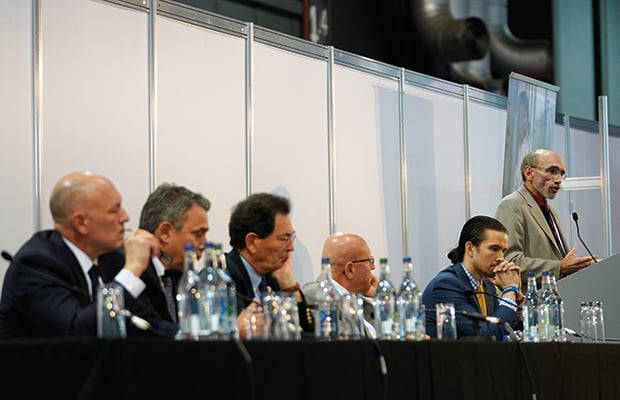The session covered various aspects of the Program, including its overall vision and some insight into the community that the Program is looking to serve. Practical issues were also addressed, including some reflection on the scope of challenges faced when operationalizing a global program. The session comprised five speakers, including WFH President Alain Weill.
Weill highlighted the issue of increasing donations of factor concentrates—a key point of his second Call to Action—as well as the importance of training and the economic benefits the WFH Humanitarian Aid Program will bring countries.
The first presentation was given by Assad Haffar, Director of Humanitarian Aid Program, WFH, who laid out the vision of the Program and talked about some of the patients the Program was helping.
The audience then heard from Glenn Pierce, MD, PhD, who sits on the WFH Board of Directors. Pierce expanded upon the mission of the WFH Humanitarian Aid Program, including defining the scope of the challenges faced, the reality of operationalizing the expanded Program, addressing unmet needs and current training activities.
John Cox, Chief Executive Officer of Bioverativ, a Sanofi company and Guido Oelkers, Chief Executive Officer of Sobi then spoke to how their organizations have come together with the WFH, and other partners, to increase the reach of the Program. Both addressed the value of participating from a moral perspective and spoke powerfully on they felt it was imperative that more companies contribute to the Program.
Contributors
The visionary contribution from Bioverativ, a Sanofi company, and Sobi to the WFH Humanitarian Aid Program translates into 500 million IUs over five years (2015-2020). Bioverativ and Sobi also make ongoing substantial financial contributions to support the logistics of product delivery and training of providers and patients in humanitarian aid countries. Furthermore, the eight-year commitment (2014-2021) from Grifols totaling 200 million IUs, along with a ten-year commitment (2009-2018) from CSL Behring for a total of 22 million IUs, and the three-year agreement (2017-2019) with Green Cross for 6 million IUs, allows for a more predictable and sustainable flow of humanitarian aid donations to the global community.













